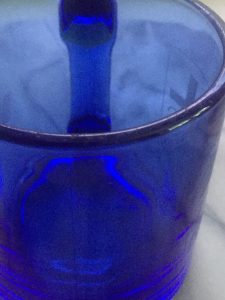Drink From the Blue Cup
One morning last week, after another night of disrupted sleep, I stood in the kitchen before 6:00 a.m., unable even to choose a mug for my tea. The words “When I drink from the blue cup that is all that I do” came into my head, shaken loose by the early hour and the weariness that sometimes thins the membrane between the present and the past.
The person on the train who first spoke those words to me swam into memory’s view. At first I could not recall his features with precision. They remained hidden by time and the shadow of the cap he always wore. I met this man I will call Jacob in late winter of 1986, not long before I separated from my first husband. I was reading a book on the platform, waiting for the evening train at what has been renamed Jefferson Station in Philadelphia. Leaving the Land, a novel by Douglas Unger, told the story of woman trying to hold onto her family’s farm. The snowed-in farmhouse on the cover captured my sense of isolation. I was seeking whatever lessons might be found in her struggle to make hard choices.
I jumped when a voice close by my ear asked to see my book. Jacob apologized immediately for startling me. His gentleness put me at ease. When I showed him the cover, he smiled. Deep creases formed around his hazel eyes, shielded by gold wire-rim glasses. He’d once taught that novel in a class on environmental literature, he said. Except for a few of his students, he had never known anyone else who’d actually read the book. After that day, we sought each other out on the crowded platform and sat together when we could. We spoke often of what we’d been reading and rarely about anything else.
It was my estranged husband who turned Jacob and me into more than acquaintances. He followed me to the train after work one day and saw me in conversation with Jacob. I don’t remember what my ex said to me, or how he looked when he approached us, but my body remembers and, as I write this, recreates the knot that formed between my shoulder blades when he sat next to me on the ride home. Jacob must have read something in my expression or the way I held myself, because he stood in the aisle swaying above us even after other seats opened. His presence reassured me and irritated my spouse, who concluded by the time we reached our destination that “that man” was my new boyfriend.
The next time Jacob and I rode the train together, I warned him about my jealous spouse, in part for his own safety, but also because I sensed that Jacob would understand my predicament. My instincts about him were not wrong. Over the course of the next few weeks, we shared more about our personal lives. I spoke of the strain of deciding whether or not to end my marriage. He told me about his own suffering.
He had lost a child a few years earlier and the grief had nearly destroyed his marriage. He was in his early fifties by the time we met and his marriage was intact. His surviving child was closer to his wife than to him and this remained a tender place. He told me what he’d learned in therapy: don’t rush through the rough patches, although the normal tendency is to skip over the hard stuff. Hold there, he said, until you can get to the source of the trouble. As the weeks passed and I chose to divorce, Jacob was a source of quiet support.
It was during one of our personal conversations that he urged me to read The Snow Leopard, a book by Peter Matthiessen about an expedition the author took to Nepal not long after his wife died. The story sustained Jacob after the death of his child. He thought the book might help me navigate the upheaval created by my divorce. The essence of the book, for Jacob, was in Matthiessen’s spiritual journey to reach a moment of being fully present. He encouraged me to find that place in myself, and used the writer’s words to reinforce the lesson. “When I drink from the blue cup that is all that I do.”
Here was the basic human kindness for which I had been yearning. I dropped my guard and let Jacob know something of my vulnerability. I was not prepared for my reaction. The closeness terrified me. In my experience, someone who knew your weakness would use it as a weapon against you.
Soon after, I moved into the city and took the train less often; I was relieved to let the friendship wither. It was only after I no longer saw him that I borrowed The Snow Leopard from the library. Jacob had been right. Traveling with Matthiessen on his pilgrimage into the Himalayas gave me more strength to cope with my own obstacles. Once or twice that summer, the idea came to me that I should seek Jacob out at the train station and let him know, but I never acted on the impulse.
And yet, the gift of our brief connection remains. Across all these years, the words he taught me can still rise up unbidden to calm an inner storm. Jacob’s warmth abides with me as I take a deep breath and remember to focus on just one thing.

